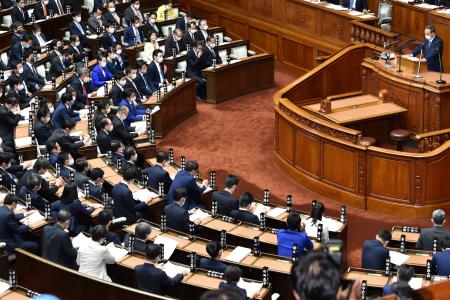
- ARAB NEWS
- 06 Jul 2025

TOKYO: Japanese Prime Minister SUGA Yoshihide said Monday that his country will reduce its greenhouse gas emissions to zero by 2050.
“We declare a goal of realizing a decarbonized society,” Suga said at plenary meetings of both chambers of parliament in his first parliamentary policy speech since he took office last month.
Tackling global warming is “not a constraint on economic growth,” Suga said. “We need to think that this will bring about innovative changes to the industrial structure, economy and society, leading to big growth,” he said. Suga suggested creating opportunities for the central and local governments to discuss the issue.
On the fight against the novel coronavirus, Suga pledged to prevent an explosive growth of infections, to “protect people’s lives and health.” The prime minister said he will closely watch economic developments in Japan and abroad and “take necessary measures without hesitation.”
“We’ll resume social and economic activities to make our nation’s economy vibrant again,” he also said, vowing to secure a capacity to conduct 200,000 coronavirus tests a day, provide free coronavirus vaccinations and appropriately conduct the Go To series of government-sponsored programs to shore up consumption.
Suga expressed his resolve to hold the Tokyo Summer Olympics and Paralympics, which have been postponed by one year to 2021 due to the COVID-19 pandemic, as a symbol of mankind’s victory over the coronavirus.
The prime minister promised to work promptly and produce results on his key policy issues, such as promoting digital transformation, covering fertility treatment with public insurance and reducing mobile phone charges.
He did not mention his controversial refusal to appoint six scholars recommended by the Science Council of Japan to be new members.
Suga stressed that he will follow the path laid down by the administration of his immediate predecessor, Shinzo Abe, who served as prime minister for seven years and eight months in his second administration.
“We’ll inherit Abenomics and further promote reforms,” Suga said, referring to the economic policy mix of the former prime minister.
On constitutional reform, Suga said he hopes that each political party will come up with its position and hold constructive discussions.
Suga suggested that he will make full efforts to reconstruct areas hit by the March 2011 earthquake and tsunami.
“Without the reconstruction of Tohoku, there will be no revival of Japan,” he said, referring to the hardest-hit northeastern region.
He promised to boost local incomes through tourism and agricultural reform.
On diplomacy, Suga said South Korea is “an extremely important neighboring country.”
Japan will strongly request that South Korea acts appropriately to bring the bilateral relationship back to a healthy one, Suga said, apparently referring to a dispute over South Koreans requisitioned to work for Japanese companies during World War II.
The prime minister stressed that the abductions of Japanese nationals by North Korea are “the most important issue” for his administration. He voiced his resolve to meet unconditionally with North Korean leader Kim Jong Un.
He said Tokyo needs to resolve a territorial dispute with Moscow over four Russian-held northwestern Pacific islands, not leave it to future generations.
Regarding Japan-China relations, Suga said Tokyo will work together with Beijing on common issues. He added, however, that Japan will say what it needs to say, apparently referring to repeated intrusions by Chinese coast guard ships into Japanese waters around the Senkaku Islands in Okinawa Prefecture, southernmost Japan.
Suga stressed the need to move forward with the relocation of the U.S. Marine Corps’ Futenma air base in the Okinawa city of Ginowan to the Henoko coastal district in Nago, another city in the prefecture, noting that the alliance with the United States is “our country’s diplomatic and security linchpin.”
After the government scrapped a plan to introduce the Aegis Ashore land-based missile defense system, he also pledged to come up with alternative policies.
JIJI Press